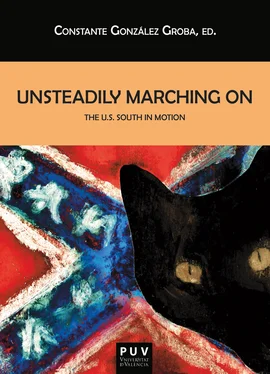But in order to fully relocate his self in the present, Will chooses a new father in the person of Sutter Vaught who bears a resemblance to his actual father in that he too has suicidal tendencies. Now that Will has given up his psychiatrist, he expects Sutter to give him the answers to his existential worries. Ironically, Will’s first contact with Sutter is through a paper titled “ The Incidence of Post-orgasmic Suicide in Male University Graduate Students ” but though “the engineer read the article twice [he] could not make head or tail of it” ( LG 65). Will’s interrogations about the paper lead him to think that Sutter has a secret he must find out about. As a consequence, he becomes increasingly interested in Sutter, an interest that increases when Rita tells him: “I saw him meet a man (…) ask him two questions, then turn to me and say: that man will be dead of malignant hypertension inside a year” ( LG 181). Sutter is presented as a prophet, one who can read into things, into people, and one who knows about the future. Knowledge appears to be what Will is after, something whose worth no one can define but something that can help shape one’s personality. Upon meeting Sutter for the first time, Will tells him, “I only want to know what you know” ( LG 218).
Will’s decision to leave the North is in keeping with his initial decision to “engineer” his life. Making Sutter’s acquaintance adds to his intuition that getting closer to Kitty and confirming his manhood will validate his identity. He “imagines that he may regain the world only by losing his virginity; yet remaining a gentleman is necessary to his self-esteem” (Broughton 100). Sexual experience becomes a point of honor for Will and his feelings prove that he believes sex can fulfill an ideal of virility. Incidentally, his existential questions always involve honor, probably because he is a southerner and wants “to perpetuate ideals of loyalty and obligation” (Wyatt-Brown 20). Nonetheless, the implication here is that clinging to honor is no longer useful because the world has gone mad and honor has become meaningless. Taking on the role Will has selected for him, Sutter gives him the advice he’s been seeking: “Fornicate if you want to and enjoy yourself but don’t come looking to me for a merit badge certifying you as a Christian or a gentleman whatever it is you cleave by” ( LG 225). Sutter’s discourse is fatherly in that he both gives Will his blessing and warns him, basically telling him to take his own responsibilities. The rediscovery of his South seems to have helped Will take responsibility for his own life.
The perspective of the trip to the South has Will “set about putting his life in order” ( LG 87), a phrase which confirms his eagerness to make a change. He takes Mr. Vaught’s job offer to take care of Jamie seriously as for him it is full of hope: a new life, a new place, a girl. The job presents itself as a good rotation 7 for Will because, as Mr Vaught explains, the South stands apart from the United States, where “there’s been a loss of integrity […] all the things that made this country great” ( LG 81). The only remedy to the modern malaise is to go to the South, where values still matter, or so the characters think. Mr. Vaught is very close to Binx Bolling’s Aunt Emily, who exemplifies the myth of the southern stoic in her belief that man must face all that life offers with strength and silent dignity. However, southern values crumble when Mr. Vaught fails to show up at his appointment with Will on the day of the departure. For Will there is no turning back: he has given up his job and his room and so he leaves New York and heads south, where he hopes to catch up with the Vaughts. Percy’s goal was probably to prove that Will’s pilgrimage to his origins could only be achieved if he made it alone.
The trip undoubtedly helps Will to gain self-confidence: “I want to make it clear what apparently I failed to make clear in New York, that from the beginning I accepted Mr. Vaught’s offer with great pleasure and shall be happy to go to school with Jamie or anywhere he wants to go” ( LG 157). And, acting like a perfect gentleman, Will adds, “I had already committed myself to Mr. Vaught and I always honor my obligations” ( LG 158). Going southward has revived Will’s ideal of southern honor and he proves his right to “gentlemanhood,” as the title of the novel suggests. It must be added that Will’s decision to travel south is also intimately connected to Kitty: he believes that she is the one for him, the only person in whom his desire to behave according to southern honor and to confirm his virility can be reconciled. Will’s relationship with her is therefore one of the central elements in the narrative.
One of the reasons why Will is attracted to the young woman is that she saved him from one of his bouts of amnesia. At first, however, the attraction is not reciprocal and Kitty remains quite distant. The two of them do not seem to have the same vision of love: Will is trying to find an answer to the questions of the heart, while Kitty appears to be more interested in the sexual act—in Panthea Broughton’s words, “as a modern woman, [Kitty] feels obliged to see love as a matter of sex alone” (104). The first osmotic contact between the pair happens when Kitty becomes sick and asks Will for support, but this episode of intersubjectivity is short-lived and communication fades away. For Richard Pindell, Will and Kitty’s love-making fails because they are “unable to possess themselves or each other. Utterance is reduced to a form of existential absence. Despoiled of their sovereignty, the two remain vacancies in a void” (55). When Will catches up with the Vaughts in the South, he finds a different Kitty: “…we have become like strangers. Worse, we avoid each other” ( LG 165). After Will has cleared the air between them, Kitty’s attitude changes and Will decides, “I shall court her henceforth in the old style” ( LG 166). Their relationship is, however, anything but satisfactory, and their last encounter indicates the path it is taking: “They separated at a fork in the campus walk, she bound for the Chi Omega house to fetch her books, he for his Theory of Large Numbers ” ( LG 288). Omega being the last letter of the Greek alphabet, it is likely to symbolize the fact that Kitty has come to the end of the road and that, in spite of their commitment, their relationship has reached a dead-end.
At this stage of the novel, Will is still looking for a home in the world: “It came over him suddenly that he didn’t live anywhere and had no address” ( LG 313). The issue of memory keeps coming back to Will and his desire to remember is the same as Camus’s Meursault’s who declares that he would like “a life where I could remember my present life,” 8 because he feels empty inside. 9 Mr. Vaught’s job offer therefore comes as the perfect opportunity for Will to revisit his family past. Unfortunately, Will’s hopes flounder when he realizes that “The South he came home to was different from the South he had left. It was happy, victorious, Christian, rich, patriotic and Republican” ( LG 185). Once again, he feels “dislocated”: “It was like home here but different too” ( LG 164). The discrepancy that Will perceives between the remembered place and the present place is important as he realizes that change is at the core of experience. His feelings of displacement and dislocation are linked to a past that he has hidden and does not want to face. At the Vaughts’, however, he is going to step back into the past and unconsciously relive his father’s suicide and the terror he felt back then.
One night, Will awakes with the certainty that he has heard a shot. Like a robot, he ascends the stairs “as if he knew exactly where he was, though he had only once visited the second floor and not once been above it. Around again and up a final closeted flight of narrow wooden steps and into the attic” ( LG 239). As this quotation makes clear, action is central; yet, the absence of a verb indicates that what is at stake has to do with emotion rather than motion. The attic appears to be Will’s final destination, one he was guided to by an unknown force. In his frantic run, he has woken up Kitty and he asks her, “Is there a room up here?” ( LG 240), as if to confirm his intuition that there is something hidden from him, a place where he might find the answers to his existential questions. Obviously, Will does not recognize the place: it is not the attic he was expecting to find. It will take another trip for him to grasp the meaning of his vision.
Читать дальше












